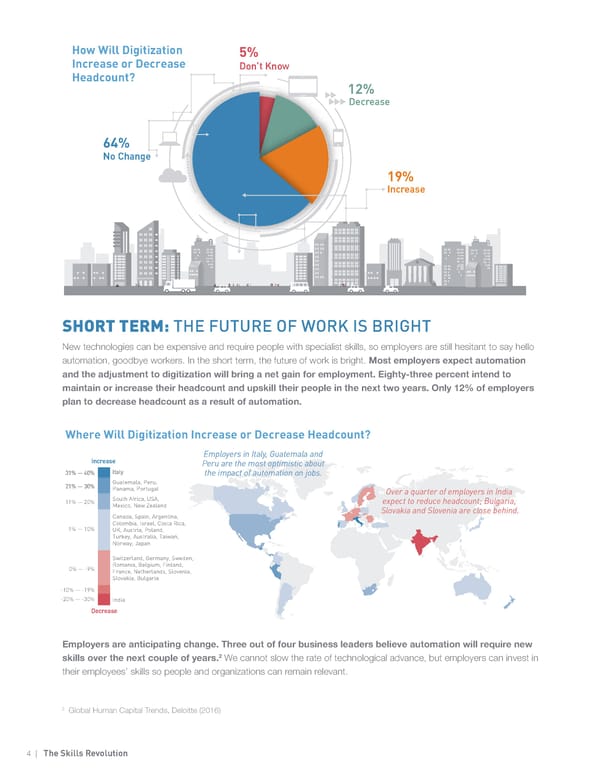How Will Digitization 5% Increase or Decrease Don’t Know Headcount? 12% Decrease 64% No Change 19% Increase SHORT TERM: THE FUTURE OF WORK IS BRIGHT New technologies can be expensive and require people with specialist skills, so employers are still hesitant to say hello automation, goodbye workers. In the short term, the future of work is bright. Most employers expect automation and the adjustment to digitization will bring a net gain for employment. Eighty-three percent intend to maintain or increase their headcount and upskill their people in the next two years. Only 12% of employers plan to decrease headcount as a result of automation. Where Will Digitization Increase or Decrease Headcount? Employers in Italy, Guatemala and Increase Peru are the most optimistic about 31% — 40% Italy the impact of automation on jobs. 21% — 30% Guatemala, Peru, Panama, Portugal Over a quarter of employers in India 11% — 20% South Africa, USA, expect to reduce headcount; ularia, Meico, e ealan lovaia and lovenia are close behind. anaa, S ain, Argentina, olomia, I€rael, o€ta ‚ica, 1% — 10% Uƒ, Au€tria, Polan, „ur…ey, Au€tralia, „aian, oray, †a an Sit‡erlan, Germany, Seen, 0% — ‹Œ% ‚omania, ˆelgium, ‰inlan, ‰rance, etherlan€, SloŠenia, SloŠa…ia, ˆulgaria ‹10% — ‹1Œ% ‹20% — ‹30% Inia Decrease Employers are anticipating change. Three out of four business leaders believe automation will require new 2 skills over the next couple of years. We cannot slow the rate of technological advance, but employers can invest in their employees’ skills so people and organizations can remain relevant. 2 Global Human Capital Trends, Deloitte (2016) 4 | The Skills Revolution
 The Skills Revolution Page 3 Page 5
The Skills Revolution Page 3 Page 5.jpeg)